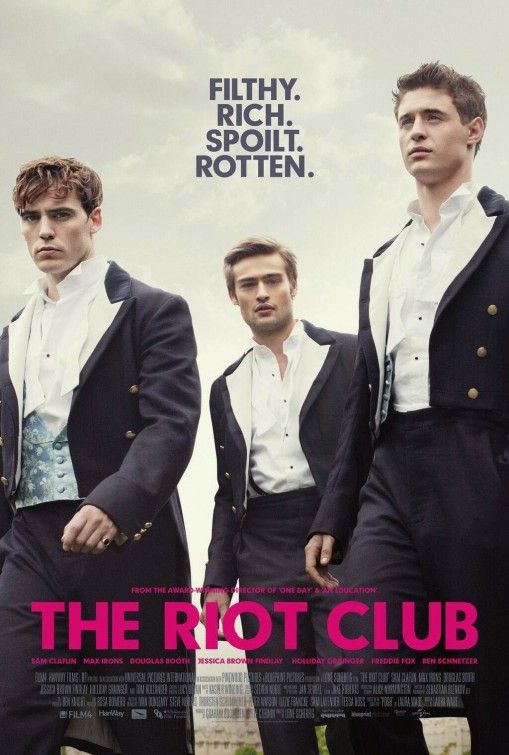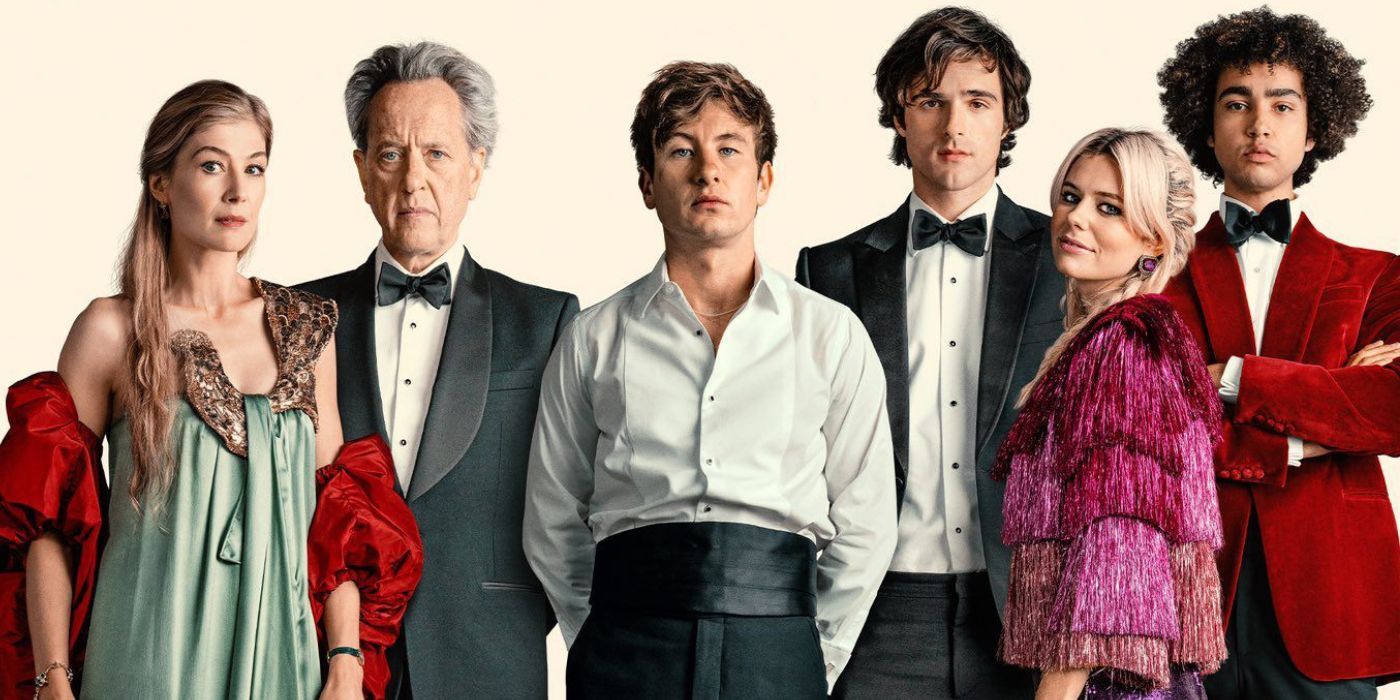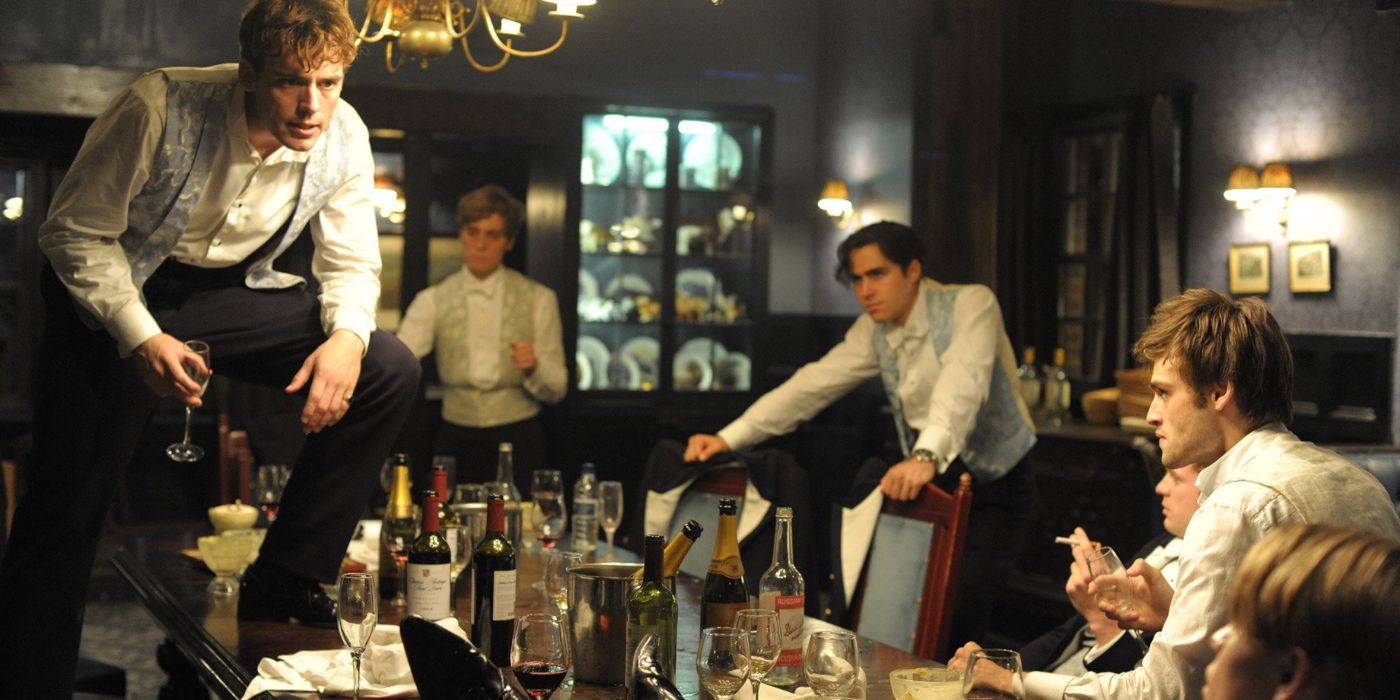The Big Picture
-
The Riot Club
offers a brutal portrayal of power in the hands of entitled youth, devoid of humor or redemption for its main characters. - The initiation dinner scene in
The Riot Club
is sickening and brutal, showcasing the extremes of the club’s entitlement and barbaric behavior. - Unlike
Saltburn, The Riot Club
takes a harsher look at wealth, stripping down any human decency in its characters and emphasizing the generational cycle of entitlement.
Before Saltburn portrayed the busy halls of Oxford University, The Riot Club showed the darker side of its elite student population in one of the most stomach-churning non-horror movies ever made. It may share a setting with Emerald Fennell‘s sophomore feature, but The Riot Club removes all the whimsy and satire of Saltburn and gives a brutal portrayal of power in youthful, unforgiving hands. The movie’s duration shows only a small window of time, with a vast majority focused on a single initiation dinner that takes place over one night. What transpires is a rapid spiral into chaos and destruction as the members of The Riot Club engage in drinking games and dares. Led by a cast including Max Irons, Sam Claflin, and Douglas Booth with short appearances from Challengers star Josh O’Connor and Game of Thrones actress Natalie Dormer, The Riot Club removes its rose-tinted glasses and shows a bleak portrayal of the extremity of generational wealth. It’s a difficult watch, relentless in its depiction of entitlement and privilege with no redeemability for its main characters.

The Riot Club
In the hallowed halls of a prestigious university, ten young men are bound together by an exclusive club that prides itself on hedonism and the entitlement of the upper class. Their loyalty is tested during a wild night out, leading to catastrophic consequences that challenge their lives and the values they hold dear.
- Release Date
- March 27, 2015
- Runtime
- 107 Minutes
- Main Genre
- Drama
- Writers
- Laura Wade
What Is ‘The Riot Club’ about?
The Riot Club follows an elite society at Oxford University that shares its name with the movie’s title. The club is a fictional (although Oxford does have the real-life Bullingdon Club of which former Prime Ministers David Cameron and Boris Johnson were members), all-male society who have an extremely selective process of choosing its members; hand-picking students from aristocratic backgrounds who are privately educated. We are introduced to the two latest potential initiatives, Alistair (Claflin) who is cold and arrogant, and Miles (Irons) who appears empathetic and measured. The two are tutorial partners and immediately clash due to their juxtaposing personalities and opposing political ideologies. Both men are separately scouted by current members of The Riot Club.
Unlike Saltburn’s Oliver (Barry Keoghan), it is made clear from the start of The Riot Club that both Alistair and Miles come from privilege. In particular, Miles is shown to be the self-insert for the audience, as we follow his perspective, including the beginning of his relationship with Lauren (Holliday Grainger) who is a working-class student constantly surprised by the grandeur of Oxford. Miles’ upper-class background means he has more of a foothold in the customs of the ruling class, which makes his introduction into The Riot Club much more natural. It means, in contrast to Saltburn, The Riot Club is less of a fish-out-of-water story and more of an examination of the rich from the inside.
‘The Riot Club’ and ‘Saltburn’ Explore the Extremity of Wealth Divide
Saltburn and The Riot Club both represent the vast extremes of wealth disparities, but their different tones set the two movies apart. Saltburn is much more satirical, which allows the movie to thread dark comedy through it. The way the upper class is portrayed, particularly their out-of-touch nature, is exaggerated to a more comedic effect. One of the best examples of this is the dinner party where one of the many Henrys’ wives can’t remember how many children they have. It is a perfect representation of how dismissive and flippant the individuals the movie is poking fun at are. Saltburn is more focused on making the elite out to be clueless, out-of-touch morons who don’t know where Liverpool is or how many are in their family. It’s more lightfooted in its analysis of wealth and class, as Oliver, who is from a humble background, isn’t as targeted as some of the characters in The Riot Club.

Bring Jacob Elordi and Barry Keoghan Home With New ‘Saltburn’ Funko Pops
First the candle, now this.
The depiction of elitism and entitlement in The Riot Club isn’t played for laughs — it’s too brutal for that. When Miles and Alistair’s rooms are completely trashed by the current club members to tell them that they have been accepted, we aren’t meant to be amused by the club’s outrageous antics. This is prominent in Lauren’s response to Miles’ room, as she is completely dumbfounded that people could act in such a way, telling Miles that these people are not his friends. Although the framing and structure of the movie indicate that we are supposed to see things through Miles’s eyes, this moment suggests that Lauren is the real audience surrogate of the piece and her later treatment further separates the club from the audience. Lauren’s response to The Riot Club’s actions brings a stark contrast and is a constant reminder of the harshness of the club’s actions. There isn’t a whimsical disconnect where everything feels quite otherworldly, like in Saltburn; it is a bleak truth, and Lauren is the representation of the harm the club’s actions can do. The later treatment of her at the club’s dinner heightens this, but even her early interaction strips back any potential comedy from the movie.
The Initiation Dinner in ‘The Riot Club’ Is Sickening and Brutal
The expression of hedonism prevalent at the club’s initiation dinner begins as typical for students, with drinking games and general tomfoolery. However, the pub’s other diners disapprove of the club’s raucous behavior. The distinction between the club in their own private room and the family pub setting pushes the us vs. them narrative, isolating the group physically and thematically. Despite complaints, the landlord is easily swayed by the boys’ promise of money, and it is evident that the club plans to use their wealth to push the boundaries of what is socially acceptable.
As their actions get more and more barbaric, the movie becomes harder to watch. After stealing Miles’ phone, one of the boys invites Lauren, and after she arrives she is belittled and taken advantage of, with some of the group harassing her. Incapacitated from the alcohol, Miles is unable to stop anything before the damage is irreversible. Miles’ seemingly genuine affection for Lauren was his major redeeming quality but always felt a little dubious. This moment is the revelation that his feelings had caveats. As an audience, Lauren is both the most relatable and most likable character, so seeing her treated in such a way makes the film even more sickening.
‘The Riot Club’ Is a Much Harsher Look at Wealth Than ‘Saltburn’
Saltburn presents morally gray characters, with Felix and his family being total snobs but still managing to feel kind and a little naive. By the movie’s climax, there is a hint of guilt and sadness about their fate and what the family goes through. The representation of the elite in The Riot Club is the complete opposite. Watching them rip down the fabric of the pub, pull down the wallpaper, smash the crockery and above all else, attack the innocent pub owner and send him to hospital strips these characters of any semblance of human decency.
We see that past members of the club are now in positions of power and it’s clear they acted in similar ways when they were in the club. This isn’t played to justify their actions to the audience; it highlights how this type of behavior is passed on through generations. Saltburn ends on a more empathetic note as we feel sorry for the Catton family who have all died due to Oliver’s interference. The Riot Club ensures we feel nothing but disgust toward the main characters, as their stomach-churning actions and complete lack of redeemable qualities make them devoid of any empathy from the audience. The Riot Club rips down the expectations of aristocratic glamour and replaces it with something relentless and nauseating, making it one of the most brutal depictions of Britain’s class divide.
The Riot Club is available to rent on Apple TV in the U.S.


